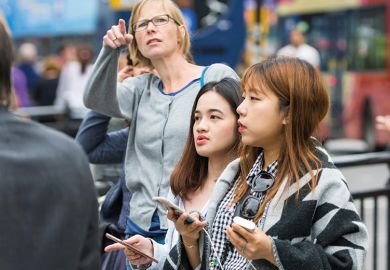In August 2014, Michael Brown, an 18-year-old black man, was fatally shot by a white police officer in Ferguson, Missouri. The shooting resulted in civil unrest and riots that continued for a week.
The event was very much part of a continuing pattern. The number of fatal shootings of black men by white police officers in the US has been increasing year on year, with 207 in December 2019 alone. It was deaths like these that led to the creation of the Black Lives Matter movement with its hashtag #BlackLivesMatter.
In this book, Tehama Lopez Bunyasi and Candis Watts Smith outline the history of the movement and explain why it is necessary. They explore how structural racism operates at all levels to impact the lives of all black people in the US: through the criminal justice system, housing, education, employment, income, health and wealth. The idea of “staying woke” in the book is based on individuals collectively thinking about how to enact change in society, at all levels, and so “building a foundation…to move toward antiracist advocacy and action in one’s community”.
Writing in a colloquial and engaging style, the authors are forthright about what every member of society should do to challenge racial inequality. They pull no punches and remind us that “Black lives are under attack and we all ought to galvanize a sense of urgency to address the direct, structural and cultural violence that Black people face…[we] cannot say we are all free and equal until those who are at the bottom of various domains of our society – political, economic, social – are also free and equal.” The book provides a simple toolkit to equip readers, particularly activists and students, with the information they need to address racial inequality by staying woke.
But while I agree with the central arguments presented in this book, its focus on practicalities and its assumption that a toolkit for “staying woke” will be enough to instigate change detracts from the complexities of how racism and white privilege continue to be part of everyday US society – meaning that, in order to challenge racism, one must also challenge whiteness and white privilege. This means ensuring that white groups check their privilege and recognise their own positions of power and the contributions they make to reinforcing racial inequalities. It is only then we can disrupt the underlying assumptions of dominant racial ideologies in order to forge a socially just society.
Kalwant Bhopal is professor of education and social justice at the University of Birmingham and the author of White Privilege: The Myth of a Post-racial Society (2018).
Stay Woke: A People’s Guide to Making All Black Lives Matter
By Tehama Lopez Bunyasi and Candis Watts Smith
NYU Press, 288pp, £15.99
ISBN 9781479836482
Published 24 September 2019
Register to continue
Why register?
- Registration is free and only takes a moment
- Once registered, you can read 3 articles a month
- Sign up for our newsletter
Subscribe
Or subscribe for unlimited access to:
- Unlimited access to news, views, insights & reviews
- Digital editions
- Digital access to THE’s university and college rankings analysis
Already registered or a current subscriber?








